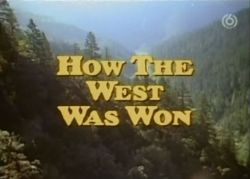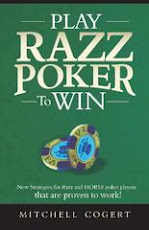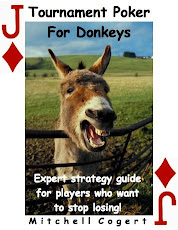 Guest Post: How Poker Skills Can Help You Land a Job or Get a Better One
Guest Post: How Poker Skills Can Help You Land a Job or Get a Better OneIf you or your friends are looking for a new job or trying to upgrade the one you have, see what POKERDIVAS CEO Ellen Leikind has to say about how the principles of poker can help you get what you are looking for. Ellen is the author of PokerWoman: How To Win At Love, Life, and Business Using the Principles of Poker. The book is available at Amazon.com as a hardcover or on Kindle.
Ellen has worked in escalating marketing positions at large consumer packaged goods companies including Pfizer and L’Oreal. She works as an Executive Consultant in the Direct Response TV industry and is a branding expert. She has an MBA in marketing from Fordham University and is a Native new Yorker.
Q. It’s a tough job market out there and people are either looking to find something new or upgrade what they have. How can Poker help you in this very tight Job market?
A. There are many valuable career boosting lessons based on principles learned at the poker table even if you have never played a game of cards. Poker rewards initiative, assertiveness, fearlessness and calculated risk taking all of which are needed for a successful job hunt. Real life stories in PokerWoman illustrate how poker has helped many women in business.
Q. What is the first thing you would tell women when looking for the right job?
A. The first thing I would say to them is stop betting like a girl. Women need to bold and take risk and play to win as opposed to avoid losing. They need to project more bravado and confidence and not be modest when it comes to selling their capabilities.
Q. What is the most important skill in getting ready for the job interview?
A. You can stack the deck in your favor by researching the company and people you want to work for. Poker Players are always sizing up the players at the table so they can play the right way against the right people. You need to know a companies objectives, products and financial situation before you walk in the door. And try to also find out something about the person interviewing you. With Google, face book and linked-in you can learn a lot. Be smart and be prepared.
Q. Once you are in the interview what is an important for the interviewee to be aware of?
A. Pay attention to non-verbal cues or “tells” during the interview both yours and the interviewer. Poker players are always looking for tells, to help get a read on another player. You have to pay attention to the cues you project. Do you make eye contact and sit up straight to project confidence or are your eyes down and hands fumbling projecting fear or lack of interest. On the other side of the coin, pay attention to the person interviewing you. If they look distracted or bored you need to look for ways to re-engage their interest. Women have good intuition in this area use it.
Q. What is the best way to bluff in an interview?
A. You need to be careful here. In a poker game you are expected to be deceptive but in a business situation your reputation is on the line. There is a big difference between a little embellishment and a total lie. If you have done something and are 70% proficient at it and know you can learn the rest it is fine to say you are good at it. But if you have never has any exposure to finance before don’t pretend you are an accountant. Remember if you are called on a bluff which is an out and out lie you have a lot to lose.
Q. What is the best way to put on a Poker face in an interview?
A. Save your poker face for after you have gotten the job offer. You need to be enthusiastic and animated during an interview to convey interest. Once you have an offer and are negotiating salary or benefits then use your pokerface to try to up the ante and get a better deal. The first offer is rarely the best offer they will give.
Q. What happens if you don’t get the job or interview you expected?
A. Remember not every hand is a winner. You are not going to get every interview or job offer even if you are the most qualified. In fact sometimes in life as in poker you do everything right and still lose. Make sure you do not let what poker player’s call a “bad beat” ruin the rest of your hands or job interviews to come. Going on tilt, or being overly emotional about your loss will hurt your ability to go on to the next opportunity. There’s always another hand or interview. Compose yourself and go on to the next. Don’t let your emotions undermine your intelligence.
Q. But it seems like I just keep losing one after the other.
A. There is a great poker story in PokerWoman about a man name Jack Strauss. He was playing in the 1982 World series of poker and thought he had gone “all in “ and put all his chips in the pot during a hand. He lost the hand and thought he was out of the tournament but when he got up to leave it turned out he had 1 chip left. He went on to win that tournament. Out of that experience came the expression “all you need is a chip and a chair.’ Keep motivated, keep playing and stay in the game and you will land something good.
Q. What can I do if I have a job but I am very unhappy and need to find something better.
A. It’s a tough economy out there but sometimes you have to have to know when to fold’em. Getting out of a bad job is sometimes a necessary evil in helping you preserve your sanity. Yes, it is a risk but sometimes you need to take a risk to up your odds for a long term win. Best to look for the job while you are still working but don’t be afraid to put yourself out there and acknowledge that it is time to move on to the next game.
Q. Anything else we can learn from the principles at the poker table.
A. In poker and in life the prizes go to the bold. Be confident, have no fear, show some bravado and bet on your self to become a winner.
Ellen, thanks for your great insights on landing a new job!













